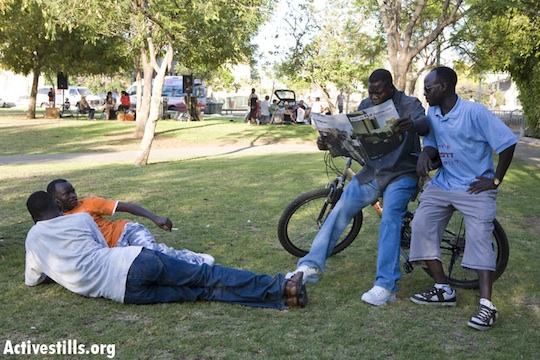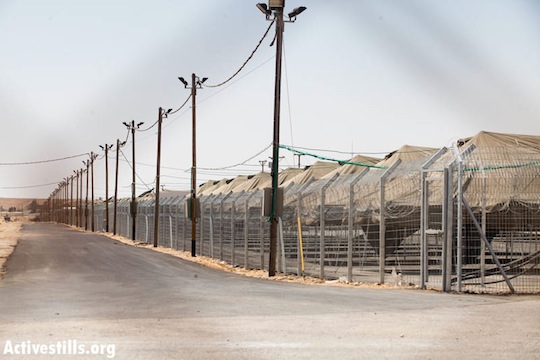Monday’s High Court ruling provided a major blow to the state’s attempt to hold asylum seekers in detention. However, despite the decision, asylum seekers are still not entitled to basic benefits such as health insurance, social services, housing and the freedom to work.
By Elizabeth Tsurkov

Refugees in Israel reacted with delight to the news of the nixing of the Anti-Infiltration Law by the High Court of Justice. Under the law, nearly 1,700 asylum-seekers, most of them Eritreans, are currently detained under the law in either the Saharonim or Ktziot internment camps in the Negev. All asylum seekers who entered Israel since June 2012 were jailed under the law, which calls for detention of all “infiltrators” (the inflammatory term the Israeli government employs to describe asylum seekers) without trial for a minimum period of three years. The court gave the state 90 days to release all detained asylum seekers.
As a result of the construction of the border fence between Israel and Egypt, very few asylum seekers have been able to enter Israel in recent months, thus most of the detainees have spent over a year in prison without an end date to their internment. One of the few ways the law allows the tribunals at the detention camps to release asylum seekers is if they are recognized as refugees. However, all asylum requests examined by the Ministry of Interior had examined have been rejected out of hand. Moreover, the Ministry of Interior has exploited the helpless situation of the detainees and pressured them into signing forms claiming that they wish to leave Israel. Ministry of Interior officials who visited the detention camps kept telling the detainees that there are no refugees in Israel, and that their only way out of prison is to go back to their respective home countries.
In an interview to +972 Magazine, Habtom, an Eritrean asylum seeker residing in Israel who has both a friend and a relative in detention, kept repeating “I am so happy” over the phone. “Everyone is so happy,” he added, “the families of those who are detained were so worried and hopeless. Today is like a holiday.” Habtom heard the news from a coworker who also has a detained relative, but said he “could not believe it” when the news broke. Only when he received a call from an activist at the Hotline for Migrant Workers, one of the Israeli NGOs that filed the petition that brought about the abrogation of the law, did he believe the news.
Click here for +972′s Laissez Passer blog on refugee and migrant rights
Other refugees were more critical. G., an Eritrean asylum seeker currently detained in Saharonim said: “Our detention was unlawful and undemocratic. Most of the people detained here were arrested when they arrived from dictatorships where their human rights meant nothing. They came here to seek asylum and instead of lending them a hand, they were locked up. The news we received about the court’s decision to cancel the law makes me very happy and gives me hope that justice will be achieved.”

Before the Anti-Infiltration Law came into force in June 2012, asylum seekers were detained for a few weeks and then dumped by buses in southern Tel Aviv. They are not entitled to health insurance, social services, housing and are not legally allowed to work (they are employed illegally, although a High Court ruling forbids the state from fining their employers).
Mua’tasim, a survivor of the Darfur genocide who lives in Tel Aviv commented on this situation: “The problem in Israel is that it doesn’t have a policy for handling refugees. The cancellation of this law is not enough. There is still a big problem.” Mua’tasim spoke to a friend who is currently detained in the Sahronim detention camp and reported: “They feel great because they’ll go out prison.” But he added: “They still don’t know what will happen to them when they go out. I am free, but my situation is bad. I cannot work or go to a health maintenance organization. I am still called an infiltrator, a migrant worker and a criminal, but I am an asylum seeker.”
Elizabeth Tsurkov is an Israeli refugee rights activist. You can follow her on twitter @Elizrael.
Read more:
Israel’s High Court nixes law allowing detention of asylum seekers without trial
With help of Supreme Court, Israeli asylum system reaches new lows
